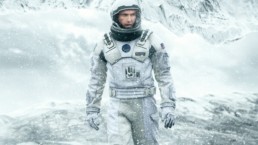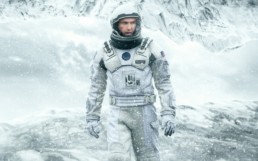Review: ‘Interstellar’
Christopher Nolan has pulled off another engrossing blockbuster full of wonder and intellect, yet digs into deeper emotional material than he ever has before.
We’re in an era where cinema and media is heading toward smaller venues, with emphasis on Netflix and other small screen content. While so many high profile directors are turning their back on grandiose movies, writer/director/producer Christopher Nolan is still keeping the embers burning. And with Interstellar, Nolan’s follow-up to the legendary Dark Knight Trilogy, he reminds the audience that “quality blockbuster” does not have to be a paradox.
Two things I’ll share about my experience watching this film: first, I went in knowing as little as possible. The less you know the better – I will thoroughly respect that in this article. Secondly, I saw it in 70mm IMAX. Like The Dark Knight Rises, I find it difficult to imagine seeing this movie in any other venue: it takes full advantage of the massive ratio. There is no gimmick: every foot of the frame feels utilized in some shots, and in other moments the mass scale simplicity of these mega spatial images is an all-engulfing experience. One particular shot from the first half stands out in my mind, which out of context is almost completely surreal, but within the narrative is fully engrossing. Moments of the film even feel like the Space Station IMAX movie that came out in the early 2000’s. If you have to be persuaded to see the film in IMAX, you may not know what you’re missing: there are no other working filmmakers who respect the potential of the massive screen the way Nolan does.
[Interstellar ] fits snugly between Inception and The Dark Knight in the Nolan canon as a modern blockbuster classic worthy of acclaim, and is undoubtedly the most emotionally charged project he has accomplished to date.
While the big points of the film are in space, what makes it work so well is how grounded the film is. We meet Cooper (Matthew McConaughey), a single father whose dream career as a space pilot was terminated after Earth’s resources began running out (the environmental component is only enough to get the story going), forcing him to be a farmer in a modern Dust Bowl. As you can imagine from the title, a turn of events brings him at the help of one big mission: to find hope for humanity deep in space.
In order to take this dream mission, he has to make the gut wrenching decision of leaving his children behind. The antagonist of the film is actually time itself: the longer and further we go into space, the harder it will be for the characters to ever return home. If you doubted that McConaughey deserved his Oscar last year, your skepticism will be silenced: here we see both a movie star and a driven actor, and his performance carries the film’s entire weight. Through his performance the film has emotional material that is rare for a blockbuster. The thought of missing out on precious time with loved ones is heart-wrenching for anyone, and while the long journey and risk of never returning has always been a touchstone of space adventures, never before have these heartstrings been pulled so poetically.
Along with the emotional weight of the film, the journey is loaded with surprises and pure fun as a good blockbuster should be. Over the three hour runtime, the film expertly balances heavy science and actual quantum physics without completely alienating the audience, and keeps us on the edge of our seat with tension and suspense, no small feat. Some suspension of disbelief is needed at first, but once in space, the movie’s logic holds up enough to enjoy the entire film. By an hour in, the scenario is gripping enough to sustain the rest of the movie, thanks to the combination of some well-placed thrills equally matched with the emotional component. With that balance, it’s hard to imagine a more satisfying cinematic experience than Interstellar. Regardless of if you think it’s a masterpiece, this is a film that begs to be discussed, picked apart, and analyzed. It may not become the definitive Nolan film that hype led it to believe, this fits snugly between Inception and The Dark Knight in the Nolan canon as a modern blockbuster classic worthy of acclaim, and is undoubtedly the most emotionally charged project he has accomplished to date. For all film fans, Nolan is a legend, and his prowess here continues. Like the space explorers in this film, one cannot help but hope for more in the future.
H. Nelson Tracey
Nelson is a film director and editor from Denver based in Los Angeles. In addition to writing for Cinemacy, he has worked on multiple high profile documentaries and curates the YouTube channel "Hint of Film." You can check out more of his work at his website, hnelsontracey.com


